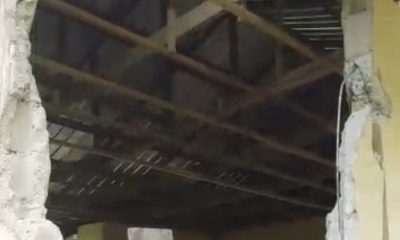National
OPINION: Restoration of Rightful Ownership: Unmasking the Warri Crisis, By Ben Binebai

BY BEN BINEBAI
The Warri crisis is an enduring occurrence and legacy of colonial manipulation, historical obliteration, and geographical thievery. Like a festering wound, this decades-long conflict continues to suppurate, fuelled by the combustible forces of ethnic tensions, disputes over political control, and the struggle for access to oil revenue. The festering scars of this crisis run deep, with over 200,000 people displaced by the conflict between 1999 and 2006, and a staggering 700,000 displaced by violence in Delta State overall.
At its core, the Warri crisis revolves around competing claims of ownership and belonging among the Itsekiri, Ijaw, and Urhobo ethnic groups. The Itsekiris claim Warri as their homeland, whilst the Ijaws and Urhobos assert their own historical and ancestral ties to the land. This dispute has been further complicated by colonial legacy, with the British colonial administration exacerbating existing tensions through their policy of indirect rule and manipulation of traditional institutions. The resultant power imbalance has had far-reaching consequences, shaping the trajectory of the conflict and rendering it increasingly intractable.
In a just and divine order, when a thief of any magnitude is caught, they lose their false inheritance, and the original owner reclaims their rightful possession. The Warri Ijaws and their leaders have fought a long and arduous battle to address the gross violation of their right to self-determination, bleedingly and with uncomfortable patience, enduring psychological trauma to restore their humanity, their history, their geography, their voice, and their right to political participation. Their struggle is a testament to the resilience of a people determined to reclaim their fundamental rights, which were crumbled and ethnocentrically suppressed through colonial and postcolonial agencies and governmentalities. This struggle is neither violence nor subjugation, but a courageous stand for justice, equality, and the recognition of their inherent dignity.
The Supreme Court’s fair judgment and INEC’s sincere and valid ward delineation exercise are significant milestones in this journey. It is imperative to note that these developments do not justify the vilification of Warri Ijaw leaders like Tompolo and Tantita, who are not national enemies, but rather citizens with sacred responsibilities to their nation. The notion that they are enemies of the state is a misguided narrative that should be put to rest.
The question remains: Who is more Nigerian between the Itsekiris and Ijaws? The answer is simple: both are equally Nigerian, with equal rights and responsibilities. The satanic campaign against Tompolo, Tantita, and the Warri Ijaws should cease, as it is unjust and unpatriotic. If the Ijaws were the ones caught importing arms, the story would have been different. However, the fact that an Itsekiri patriot was caught with sophisticated weapons of destruction in the midst of the trouble in Warri, sparked by the ward delineation exercise, points to the desperate and crude approaches employed to secure justice. Only desperate parties apply crude and desperate approaches to secure justice. The fact that some individuals resort to such tactics underscores the need for a more nuanced and equitable approach to resolving the Warri crisis.
The people of Warri can now begin to heal the wounds of the past and forge a more harmonious future, with the Federal Government, INEC, and the Senate President playing a proactive role in ensuring that the rights and dignity of all parties are prioritised.
Warri is a vibrant celebration of ethnic diversity, where inclusivity is valued and cherished. It is not the traditional headquarters of the Itsekiris, but rather a melting pot of cultures, where the Itsekiri, Ijaw, and Urhobo ethnic groups converge. The notion that Warri is a homeland exclusively for one group is a narrow perspective that neglects the rich tapestry of cultural heritage that Warri embodies. In reality, the ancestral spirits of the Itsekiri people reside in Ode Itsekiri, the land they founded, not in Warri. It is there that their history, culture, and traditions are deeply rooted.
Ode-Itsekiri is the spiritual and historical heartland of the Itsekiris, it is their ancestral roots and, therefore, their homeland. Why then, is Warri given precedence over Ode Itsekiri, which is affectionately referred to as Big Warri? Is it not again divine order to make a younger brother a Senior brother? Or a stranger your biological father? Is it time to re-evaluate the significance of ancestral homelands and settlements, and to prioritise the rights and dignity of all parties involved. By acknowledging the historical and cultural contexts of each ethnic group, we can work towards a more inclusive and equitable solution to the Warri crisis.
A homeland is a sacred and ancestral land, passed down through generations, its ownership woven into the very fabric of tradition and heritage. It is a land of unbroken lineage, where the roots of identity, culture, and history run deep, nourished by the stories and struggles of those who came before. It is a land that holds the memories of ancestors, the whispers of ancient traditions, and the rhythms of timeless customs. A homeland is not just a geographical location; it is a repository of collective memory, a symbol of resilience, and a testament to the enduring spirit of a people.
As we reflect on the Warri crisis, it is essential to acknowledge the historical and cultural contexts that have shaped the conflict. The Itsekiri, Ijaw, and Urhobo ethnic groups each have their own unique stories, struggles, and traditions that are deeply rooted in their ancestral lands. By recognizing and respecting these differences, we can work towards a more inclusive and equitable solution that prioritizes the rights and dignity of all parties involved.
The journey towards peace and reconciliation begins with a single step – a step towards understanding, empathy, and mutual respect. Let us take that step today, and work towards a future where the people of Warri can live in peace, prosperity, and harmony.













